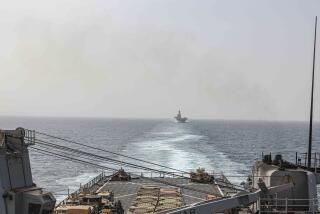U.S. Cites 4 Gulf Allies in Human-Trafficking Report
WASHINGTON — The United States on Friday listed four important Middle East allies in a group of 14 countries that could be subject to sanctions for their alleged failure to halt human trafficking across international borders.
Saudi Arabia, Kuwait, the United Arab Emirates and Qatar were lumped together with North Korea, Myanmar and Cuba in the State Department’s fifth annual Trafficking in Persons Report as nations that fail to comply with the minimum standards of control against human trafficking. It was the first time that four key allies were listed in the lowest category.
The report, required by Congress since 2000, charts illegal trade for labor and sex across international frontiers that amounts to a form of slavery.
The worst offenders face the possibility of losing U.S. development assistance, funding for educational and cultural exchange programs and American support in international financial institutions, including the World Bank and International Monetary Fund.
Unlike many U.S. government reports in the human rights field, the document released Friday also recognizes countries that have carried out “best practices” in an effort to control the problem. The report, for example, praised South Korea for responding to public pressure by enacting two anti-prostitution and anti-trafficking laws last year aimed at combating the commercial sexual exploitation of women and girls.
In remarks at a news conference Friday to present the report, Secretary of State Condoleezza Rice said that “the United States has a particular duty to fight this scourge, because trafficking in persons is an affront to the principles of human dignity and liberty upon which this nation was founded.”
“We estimate that up to 800,000 people are trafficked across international borders every year and millions more are trafficked internally,” she said.
John R. Miller, Rice’s senior advisor on human trafficking, told reporters that sex slavery was the largest category in the illegal trade in people.
The decision to list important U.S. allies considered major offenders of trafficking in humans follows an intense battle within the State Department last year that resulted in the naming of Saudi Arabia for the first time as a major violator of religious freedom. No key ally had previously been named “a country of particular concern” in the religious-freedom document.
Friday’s report comes amid a Bush administration effort to elevate the priority of human rights and democracy in its foreign affairs agenda. The move was hailed by rights advocates.
“We welcome the greater comprehensiveness of the report and the administration’s efforts to tell the truth about the trafficking of persons,” said Maureen Greenwood, Amnesty International advocacy director for Europe and Eurasia.
She said the administration could make progress simply by providing a public list. “An important tool they have is ‘name and shame,’ ” she said.
Greenwood acknowledged that she had been “a little bit surprised” that the administration had included the names of key Middle East allies, given the cautious approach taken by past U.S. governments. It was another sign of a “shifting policy context for Saudi Arabia,” she said.
Tom Malinowski, Washington advocacy director for Human Rights Watch, said the listing of the Arab countries was a “good step forward.” He cautioned, however, that the list by itself was “only a starting point,” and that the administration needed to keep pressing the issue with the listed countries all year round.
Meanwhile, another human rights group said Friday that although the annual reports have helped draw attention to the problem of international human trafficking, almost nothing is being done to address the plight of children within the United States who are being trafficked for sexual exploitation.
“This view of children in prostitution in other parts of the world
Underage prostitutes are usually treated as juvenile delinquents, instead of victims, even when they are being commercially exploited by adults, she said.
Saudi Arabia was dropped into the category of worst offenders “because of its lack of progress in anti-trafficking efforts, particularly its failure to protect victims and prosecute those guilty of involuntary servitude.”
Kuwait, the United Arab Emirates and Qatar were cited for, among other things, not taking action against the trafficking of young boys as jockeys in camel racing, a popular sport in the Persian Gulf. Many of these boys, some as young as 3, are kidnapped or bought from homes in South Asia or East Africa and sent to the Gulf, where they are kept in slavery and tied to the camels during the races.
The United States’ emerging Latin American adversary, Venezuela, was also included in the lowest possible category, along with Bolivia, Cambodia, Ecuador, Jamaica, Sudan, and Togo.
Times staff writer Sonni Efron contributed to this report.
More to Read
Sign up for Essential California
The most important California stories and recommendations in your inbox every morning.
You may occasionally receive promotional content from the Los Angeles Times.











